New to starting the vegan diet as a family? Then you’ll know how challenging it can be to create a nutritionally balanced plant-based diet that meets the requirements of both adults and children for vegan beginners.
In this vegan guide, you’ll find tips for navigating a vegan diet as a family. And if you are still trying to decide whether to go vegan or not, you’ll find answers to frequently asked questions and summaries from the latest research articles. We’ve also included key vegan foods for kids to include in your family’s diet.
Many thanks to Lena Briand for collating the research and contributing to this article.
Veganism for beginners: What is a vegan diet?
If you are considering a plant-based diet, as vegan beginners, you’ll first notice that you will mostly eat vegan foods that are plant-based. This includes vegetables and fruit, nuts and seeds, cereals, beans and lentils.
Depending on why you have chosen to follow a plant-based diet you may choose to either limit or completely avoid your family’s intake of meat, fish, chicken, eggs and dairy products.
When switching to a plant-based diet, your family can enjoy several health benefits. This includes any family goals for adults such as weight loss or helping maintain your weight in the healthy range.
Other health benefits include a lower risk of type 2 diabetes or colorectal cancer due to the foods rich in fibre.
Moreover, a plant-based diet can also answer some concerns you may have about environmental impact and animal protection by reducing animal products from your diet.
Is a vegan diet safe for children?
As vegan beginners, it’s natural to be concerned about the safety of the vegan diet in babies and toddlers.
The British Dietetic Association supports well-planned vegan diets for babies and children of all ages. However, to meet children’s growing requirements, for vegan beginners, consult with a paediatric dietitian so that you know that you are always on the right track.
Does a vegan diet affect children’s growth and development?
If your vegan diet is well planned, this diet shouldn’t impact your child’s growth and development.
However, as children have specific nutritional requirements, it is recommended to be supported by a paediatric dietitian to make sure that your child is getting enough nutrients to grow healthy.
This is particularly important for vegan beginners to ensure that your child has the best start on the vegan diet.
Diet for vegan babies
The vegan diet for babies in particular deserves tailored advice. You’ve probably heard that the first two years of a baby’s life are the most important.
Your baby’s intake will need to be sufficient to meet their daily requirements of key vitamins and minerals to support the normal development of their brain, eye and body.
In the first 6 months of life, breastmilk will continue to be their major source of nutrition.
From 6 months onwards, start weaning your baby as per the standard weaning advice.
You may wish to speak with your dietitian, health visitor or GP for guidance on which allergens to introduce if necessary.
Health benefits of vegan diets for children and adults
Plant foods variety
One of the key advantages of a plant-based diet is the opportunity to eat and serve a variety of plant foods to your family.
This will have a positive knock-on effect on your children’s overall microbiome diversity and gut health even as vegan beginners.
Body Weight
Researchers have shown that a well-planned plant-based diet can help you and your children maintain a healthy body weight.
Glycemic control
Researchers also suggest that following a plant-based diet can have a positive effect on glycemic control and especially for people suffering from type 2 diabetes.
Diabetes
Both adults and children who are overweight or obese can be at increased risk of type two diabetes. A plant-based diet may indirectly help modify this risk by therefore other health problems, this is good news for anyone starting this diet.
Bone Health
The Epic-Oxford study analyses showed that vegans had higher risks of total, hip, leg and vertebral fractures than meat-eaters, while fish eaters and vegetarians had higher risks of hip fractures than meat-eaters.
These differences may be partly explained by the lower body mass index, and lower dietary intakes of calcium and protein in non-meat eaters, especially vegans.
In contrast, the review by Emory Hsu pointed out that despite the concerns related to bone health, with planning, fortified foods and supplements, vegan families can obtain healthy doses of calcium and vitamin D.
Nutritional requirements for children starting a vegan diet
Before starting a vegan diet, it is important to know more about your child’s nutritional requirements.
You can find below more detailed information about the daily vitamin and mineral requirements for children up to 18 years of age. Once you have all the information, it is much easier to plan the diet.
Protein
Children require protein for growth and development. The recommended protein intakes for children are listed below:
- 1 to 3-year-old: 15g
- 4 to 6 years old: 20g
- 7 to 10 years old: 28g
- 11 to 14 years old: 42g for boys and 41g for girls
- 15 to 18 years old: 55g for boys and 45g for girls
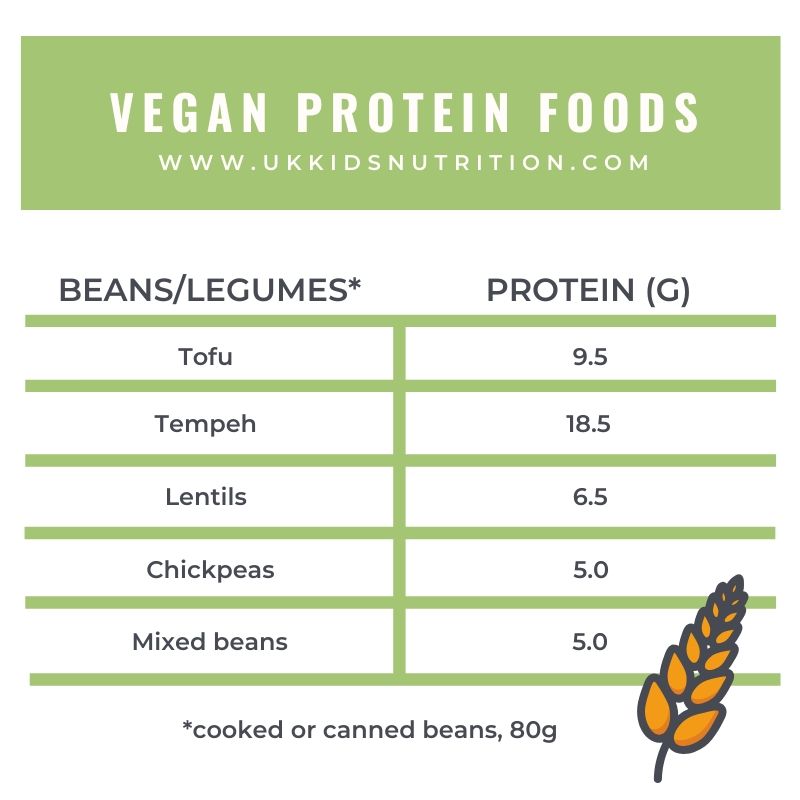
Good sources of vegan proteins are:
- tofu
- tempeh
- beans and lentils
- Quorn products
- nuts and nut butter
- quinoa
- seeds
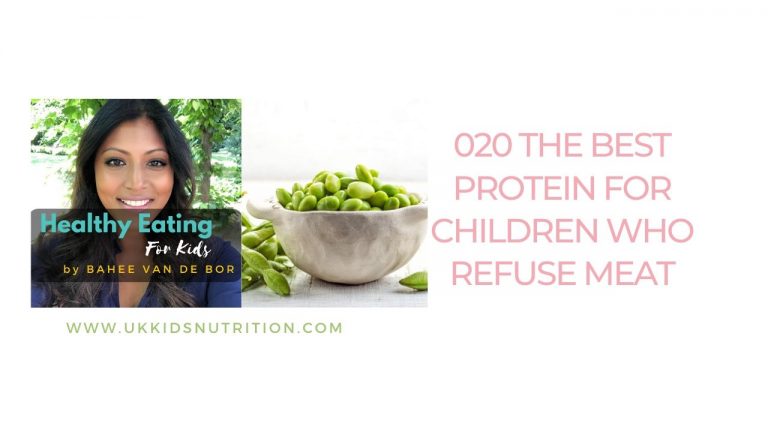
CLICK TO READ THE BEST PROTEIN FOR CHILDREN
Is tofu healthy for vegans?
And the answer is … Yes! Tofu is a great food for people following a plant-based diet as it is rich in protein, a good source of fatty acids and minerals. However, if you are concerned about proposing soya to your child, we recommend you to listen to this great podcast where you will find all the information you need about the subject!
Fat
The recommended fat intakes for children are listed below:
- 1 to 3-year-old: no specific recommendation
- 4 to 6 years old: 58g for boys and 54g for girls
- 7 to 10 years: 71g for boys and 66g for girls
- 11 to 14 years old: 97g for boys and 78g for girls
- Between 15 to 18 years old: 97g for boys and 78g for girls
Some healthy fats include seeds and nuts, walnut, rapeseed or canola oils.
Carbohydrate
Carbohydrates are essential for growing children providing a major form of their energy. At least fifty per cent of their energy requirements should be provided from carbohydrates as they also provide fibre, B & C vitamins and calcium (fortified flour only).
Good sources of carbohydrates include bread, rice, potato, pasta, fruit but also nuts, beans and lentils, quinoa
Vitamin B12
Vitamin B12 is an essential vitamin for DNA synthesis and prevents anaemia. It can only be found in animal products. Supplementation is therefore essential to meet your child’s daily requirements. Some products are also fortified in vitamin B12 such as some plant-based milk, yoghurt, breakfast cereals and yeast flakes.
| Âge | Requirements (mg) |
| Children 1 to 3 years | 0.5 |
| Children 4 to 6 years | 0.8 |
| Children 7 to 10 years | 1.0 |
| Teens 11 to 14 years | 1.2 |
| Teens 15 to 18 years | 1.5 |
Tips for meeting vitamin B212 requirements:
- use a fortified plant drink with added vitamin B12 for breakfast cereals and as a drink for young children
- choose breakfast cereals that are fortified with vitamins and minerals
- some children may require a supplement
Calcium
Daily calcium intakes are essential to support bone deposition. Calcium can be found in green vegetables, cereals, beans, some soya products and in fortified plant-based milk or yoghurt.
In children, the source of calcium is milk and dairy products. An easy swap is to switch to an alternative plant based drink for vegan beginners.
Calcium requirements
| Âge | Requirements (mg) |
| 0 to 12 months | 525 |
| Children 1 to 3 years | 350 |
| Children 4 to 6 years | 450 |
| Children 7 to 10 years | 550 |
| Teens 11 to 18 years | Male : 1000 mg and Female : 800 mg |
| Breastfeeding | 1250 |
Calcium Supplements
Breastfeeding women may need to take calcium supplements to meet their increased calcium requirements during breastfeeding.
For foods rich in calcium also see ‘What To Do Before Reaching For Calcium Supplements’.
Iodine
Iodine is an essential mineral needed for the production of thyroid hormones (T4 and T3) and is indispensable for brain and neurological development.
It is usually found in cow’s milk, dairy products and white fish so you may need to find fortified plant-based products to meet your family’s requirements.
For example, some plant-based milk drinks contain iodine, but not all. It’s important to read labels to check whether plant drinks are fortified with both calcium and iodine.
Iodine is also important for women of childbearing age. This is especially of paramount importance for adolescents who are vegan beginners and experimenting with a plant-based diet.
Iodine requirements
| Âge | Requirements (mcg) |
| Children 1 to 3 years | 76 |
| Children 4 to 6 years | 100 |
| Children 7 to 10 years | 114 |
| Teens 11 to 14 years | 127 |
| Teens 15 to 18 years | 140 |
Iodine supplements
The vegan society offers a plant-based supplement called VEG1 with B vitamins including vitamin B12, iodine, vitamin D3, folic acid, selenium and iodine.
You can purchase the supplements directly through their website.
Please note that the supplements have been designed for adults. Please speak with your paediatric dietitian for supplements for your child following a vegan diet.
Selenium
Selenium is important for reproduction, thyroid gland function, DNA production, and protecting the body from damage caused by free radicals and infection.
Most children will get enough selenium from their diet. Selenium is found in a variety of plant foods and the amount of selenium will vary depending on the amount present in the soil that it was grown from.
Good sources of selenium include brazil nuts, chia seeds, sunflower seeds, brown lentils, rice and pasta. If you like baking, it is easy to grind some chia seeds, sunflower seeds or brazil nuts and include them in your cake or dessert.
| Âge | Daily requirement (mcg) |
| Birth to 6 months | 15 |
| 7 months to 12 months | 20 |
| Children 1 to 3 years | 20 |
| Children 4 to 8 years | 30 |
| Children 9 to 13 years | 40 |
| Teens 14 to 18 year | 55 |
Iron
| Âge | Daily requirement (mg) |
| Children 1 to 3 years | 6.9 |
| Children 4 to 6 years | 6.1 |
| Children 7 to 10 years | 8.7 |
| Teens 11 to 14 years | 11.30 mg for boys and 14.8 mg for girls |
| Teens 15 to 18 years | 11.30 mg for boys and 14.8 mg for girls |
Salt
Certain plant-based products can be high in salt. Reading labels are essential to screen for added sugar and salt.
Foods such as meat-free sausages or Quorn-based products make a delicious change. However, note that these do contain added salt and won’t be suitable for babies weaning at 4 months or 6 months.
Vegan foods for kids: what is the diet for vegan beginners?
Now that you are aware of the nutritional requirements for your child, it is important to know more about the type of vegan foods you can include in your diet. So if you are wondering what to eat on a vegan diet, here is a useful list for your weekly shopping list.
- Tofu or tempeh: these are a delicious protein alternative to meat, chicken, fish and eggs. Based on soy, tofu contains all the essential amino acids required for growth.
- Legumes: you can buy dried or canned beans such as baked beans, adzuki, chickpeas, mung beans or any combination of mixed beans. You can use these to make bean burgers for children or use them to prepare a stew. Leafy greens and vegetables are also high in iron and calcium.
- Fruits: fresh or frozen in puree or smoothie, children need to eat at least 2 portions per day. Fruits contain vitamin C so it will also help your child’s body to absorb iron from plant-based iron.
- Lentils: red lentils in particular are the richest source of iron. This is another great protein source that is also rich in fibre.
- Fermented products: such as tempeh, and miso are great sources of minerals.
- Nuts and nut butter: perfect to use as a topping on toast for breakfast or as an after-school snack. Brazil nuts are rich in selenium whilst almonds are rich in vitamin E. Nuts are also a source of fibre.
- Seeds: Chia and flax seeds are useful in baking. They are a source of fibre and plant-based omega-3 fats. Pumpkin seeds on the other hand are a source of antioxidants, iron and magnesium. Magnesium has a role in regulating enzyme activity and controlling the calcium and potassium channels in the body.
- Calcium-fortified products: such as plant-based milk, yoghurt… It will help you to reach your daily requirements. You can also take calcium supplementation if you think you are not having enough with your diet. It is also great to search for fortified products which also include vitamin D, vitamin B12 and iodine.
- Nutritional yeast: it can easily be topped on meals such as salad, pasta, rice… It contains protein and some products are also fortified with vitamins which are also great to help you to meet their daily requirements.
- Whole food grains and cereals: they are a great source of carbohydrates, protein, minerals and vitamins
Vegan diet plan for beginners
In order to help you to plan your vegan diet, we have listed below what type of vegan foods you need to include for each meal.
Breakfast
- Whole grains or white four: choose from both types such as oats, or bread prepared from spelt flour, wholemeal flour
- Include a source of calcium: it could be through plant-based drinks or yoghurt. Soy drinks have the best profile for protein and are often fortified with B vitamins (including vitamin B12) and some brands include iodine.
- Fresh fruits: add fresh fruit as the source of fibre and vitamin C.
- Protein and fat: use nut butter as a spread on toast. Chia or ground flaxseeds can be sprinkled over porridge or breakfast cereals as a source of essential fats. Nuts and seeds also double up as both iron and protein.
Lunch
- Proteins: such as tempeh, tofu, hummus
- Carbohydrate: for a quick children’s lunch box include slices of wholemeal bread for sandwiches
- Fat: avocado or hummus
- Vegetables: tomatoes, salad, carrot, avocado, can be great in a sandwich
- Fruit: sliced fruit is a nutritious dessert for children and a useful source of vitamin C which will boost the absorption of plant iron
Dinner
- Colourful vegetable starch such as grains or starchy vegetables such as potatoes / sweet potatoes
- Proteins: such as tempeh, soy, beans or quinoa can also count as protein.
- Carbohydrate: include a source of carbohydrate such as pasta, rice, lentils, beans, quinoa, cereals
- Vegetables: add all the vegetables you like including the green leafy vegetables (spinach provides iron whilst kale is a source of calcium)
- Fruits: encourage children to eat at least two servings of fruit daily
Snacks
- Protein and fat: nuts are a healthy snack and can count for protein and fat intake.
- Fruits: a source of vitamin C, B vitamins and antioxidants
- Calcium: include a glass of fortified calcium drink or yoghurt to meet the daily requirements (read labels to verify that these are fortified)
- Also, see ‘20 Plant-Based Snacks Your Kids Will Love’
What are the tips for a vegan beginner?
If you are a bit lost with all the information you have read so far and are looking for recommendations for vegan beginners, here is a great list of our top tips.
- Spend time in the kitchen: being vegan does not mean you need to only buy vegan products, it also means you can cook more. Use herbs and spices to marinate and in cooking to magnify the delicate flavours of some plant foods. e.g. tofu soaks up flavours well
- Consider a vitamin B12 supplement: vitamin B12 vitamin isn’t present in plant foods but it is an essential vitamin for your body. B12 deficiency anaemia can cause irreversible issues and the most common complications are heart conditions and problems with the nervous system. It is recommended to find reliable sources of B12 either in fortified foods or as a separate daily supplement. It means that your child will have to take a supplement on a daily basis or can eat fortified products to meet their daily requirements too. Many plant-based products are now fortified, such as plant-based milk alternatives, some yoghurts and breakfast cereals.
- A vitamin/mineral supplement: depending on your family’s daily meal choices, as vegan beginners, you may also need supplementation of other minerals and vitamins such as iodine. If you are worried about your child’s intake or want to know more about children’s requirements, book an expert consultation.
- Try new foods: trying a vegan diet is also a great opportunity to discover new flavours and foods such as new vegetables, nuts and seeds, and to experiment with nut butter like making your own cashew, almond or peanut butter.
- Other ways to cook tofu: blend tofu straight from the box to make a creamy sauce for ‘Mac n Cheese’
- Chickpea water (aquafaba): reserve the water from the tin of chickpeas and beat vigorously using a mixer. This makes a stiff white fluffy mixture which can be used in baking as an egg replacement in cakes and biscuits or to make your own egg-free meringues and macaroons. See instructions by the Minimalist Baker.
- If you like baking, flax eggs and chia eggs are great alternatives to normal eggs. Just put 1 tablespoon of chia or flax seeds in a glass and mix with 3 tablespoons of water. Rest for 15 minutes. You will have a mixture a bit gelatinous which is perfect for cake or cream.
As you may still have some questions about the vegan diet, we have included in this section the most common questions families may ask before starting a vegan diet.
What is the easiest way to go vegan and stay vegan as a family?
We don’t think there is an “easy way” to become vegan. Changing your diet is a real commitment but of course, you are free to change your mind at any time.
If the children miss eating meat or cheese, why not try new cuisines? Asian and Indian vegetarian dishes are bursting with flavours that your children won’t notice that the dishes are meat or egg-free.
Some families continue to enjoy small quantities of meat, chicken or fish during the week and enjoy plant-based dishes, the majority of the time. It’s entirely your decision about whether you wish to avoid animal products entirely or still enjoy them occasionally.
Also, if you are more of a sweet fan, you need to know that most chocolate bars with 72% or more cacao are vegan! Just have a look at the ingredients list to make sure it is vegan chocolate.
Moreover, a lot of vegan ice creams are available in stores with a variety of flavours.
How easy is it to change to a vegan lifestyle?
Changing your diet is not easy. Like all changes, it requires some time and patience to adjust to the new flavours and routine. If you have young children, help them adjust to the diet slowly.
Plant-based diets tend to be high in fibre which can cause a bit of discomfort initially. If you are worried about changing your child’s diet, book an expert consultation for personalised advice.
Is veganism a practical diet?
Even if starting a vegan diet can look difficult, it is now much easier to be vegan! The food choices are indeed increasing every year with new products coming into the stores.
You will also discover new plant-based restaurants opening that is suitable for the family! Once you will have spotted the right ones, I am sure your family will find it easy to manage.
How to look after your teenager who is the only one going vegan?
If your teenager has decided that they wish to go vegan, that’s okay. You now know how to support them with a plant-based diet.
If they are the only person in your family on a vegan diet, we recommend you carefully plan the meals together for the week.
This way, you are always sure to include relevant foods in the weekly shopping.
Writing a weekly vegan menu is also a great opportunity to save some time during the week. This will help minimise frustrations if the right ingredients have not been purchased to prepare a complete and nutritious meal.
What are some of your best smoothie recipes for beginners?
Our favourite vegan recipe for a smoothie so far is the Kiwi smoothie. It is a very easy vegan recipe l as you can see in the method below. Moreover, if you are also looking for vegan snack recipes for your children, we recommend you read this article!
Ingredients
3 peeled green kiwi fruit
1 can pineapple pieces
1 mango, peeled, stoned and chopped
Methods
Pour all of the ingredients into a blender and blitz until smooth. Pour into two glasses. For variation, why not add berries and layer the drink to create a rainbow effect?
What are the best ways to cook sweet potatoes?
Sweet potatoes are delicious. Kids often love its naturally sweet flavour.
Moreover, it is rich in vitamin A which is an important vitamin in supporting immunity and the normal development of the eye.
You have multiple options to cook them so just choose the option your child likes the most. For example, you can boil them for about 20 minutes in hot water or grill them in the oven for about 30 minutes at 190 degrees.
Bottom line
Are you looking for help navigating plant-based nutrition for your vegan baby? Then with a little bit of expert help, you can easily make sure that your baby’s diet is nutritionally balanced for vegan beginners.
For personalised advice for your child on a plant-based diet, book a 1-2-1 initial expert appointment.
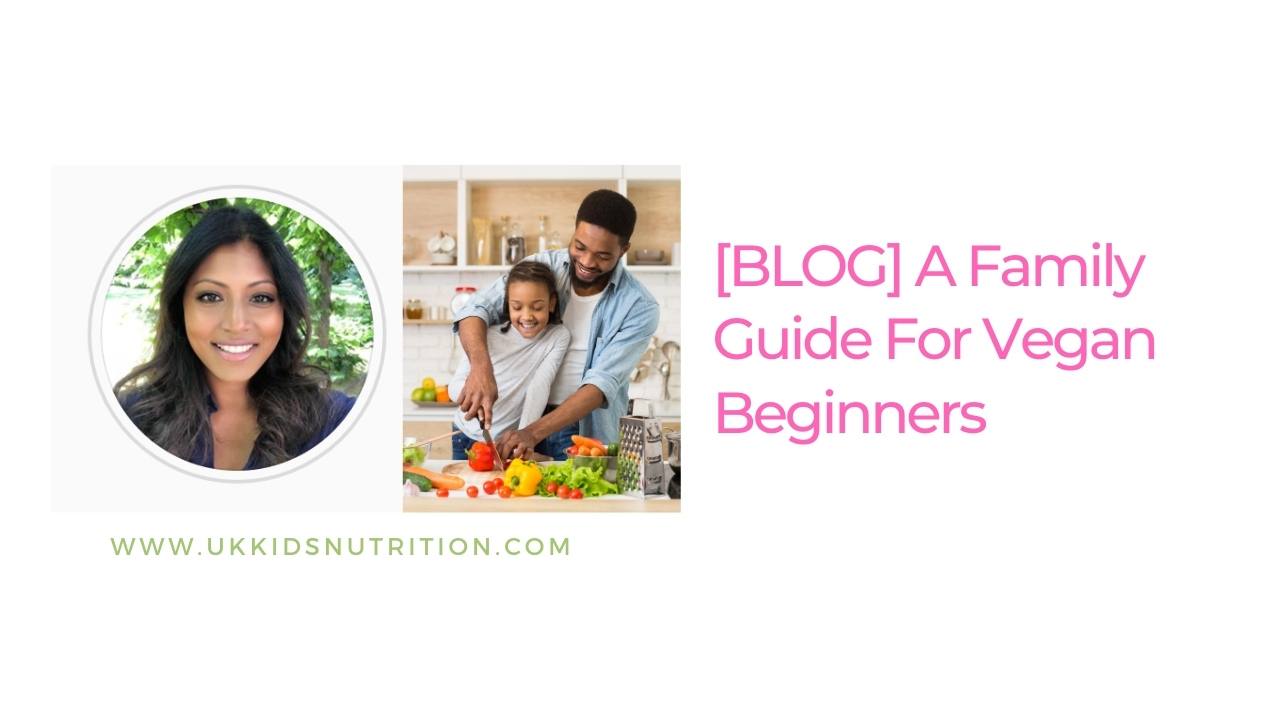
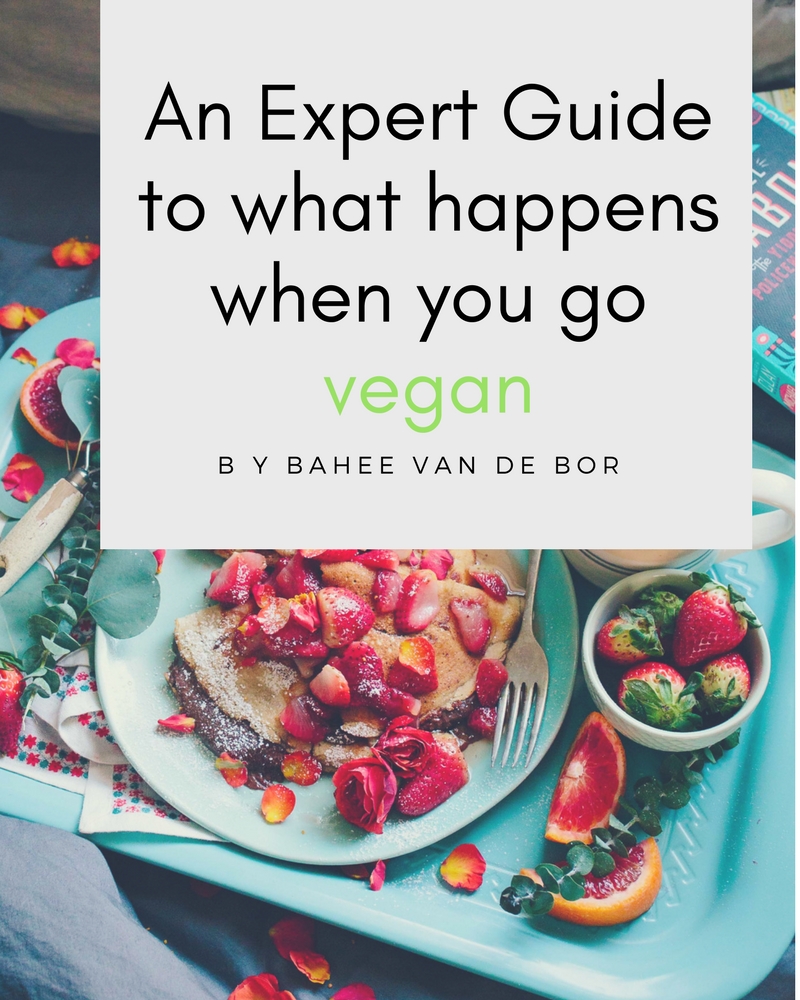
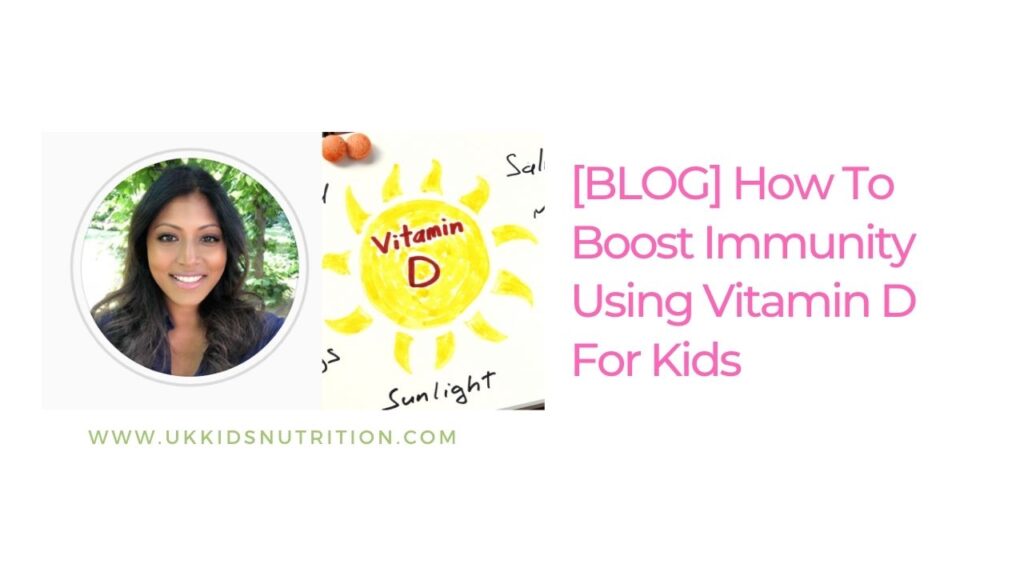
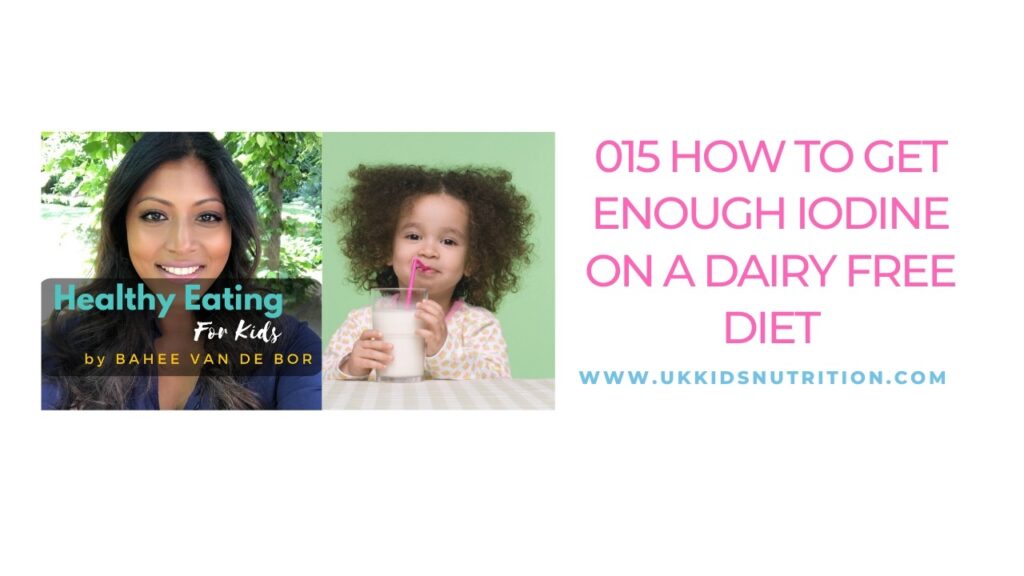
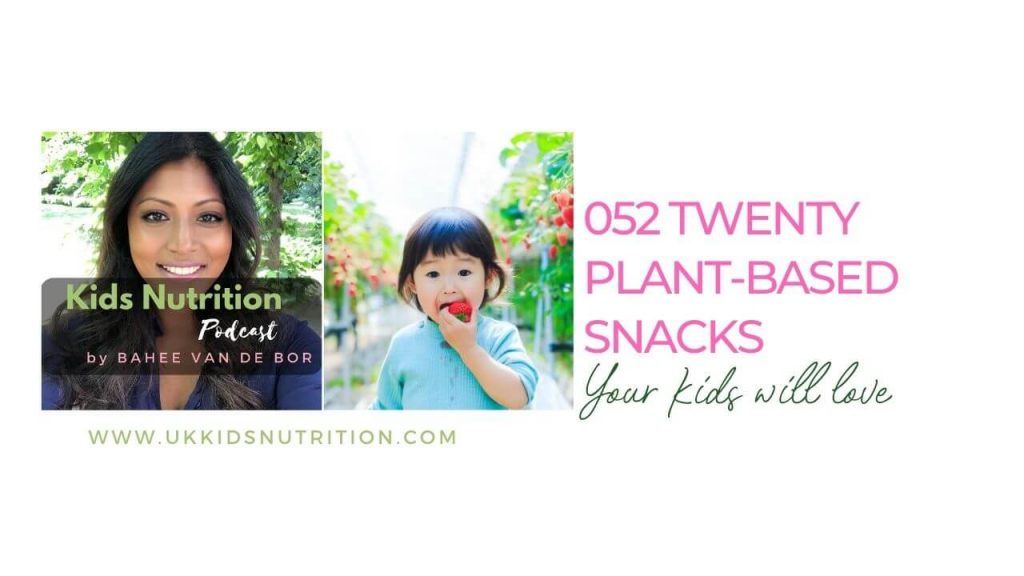
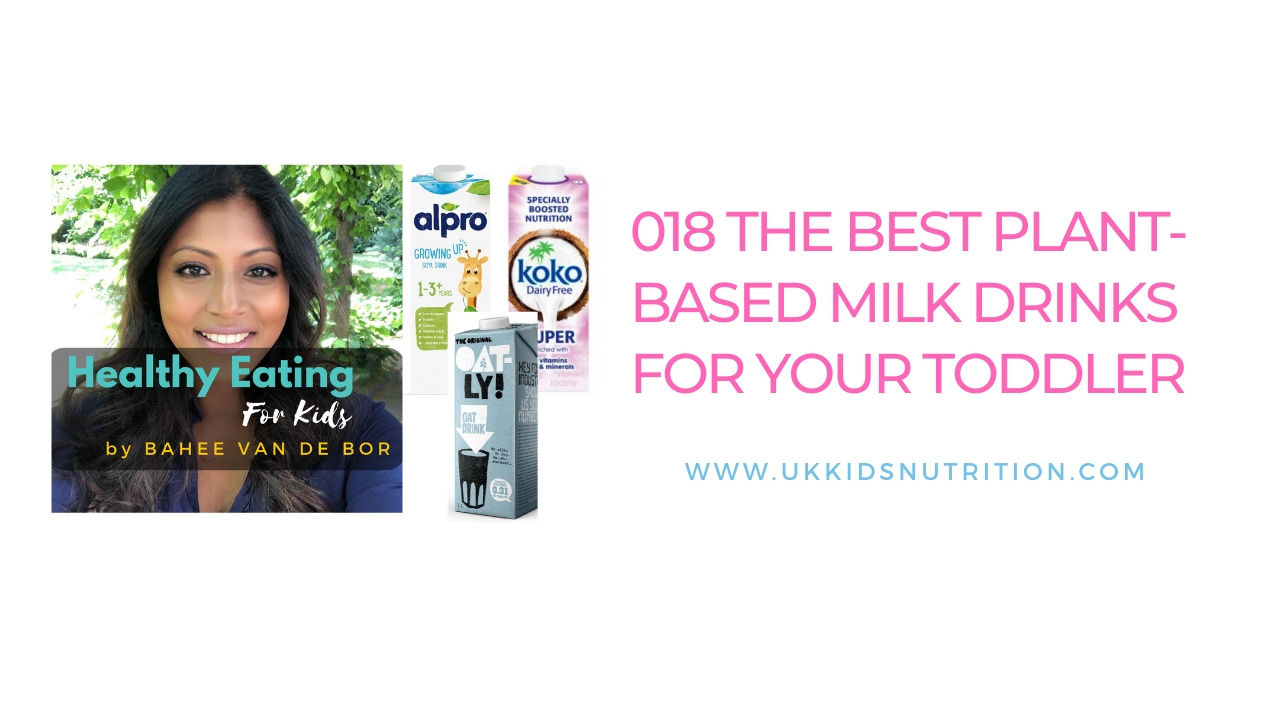
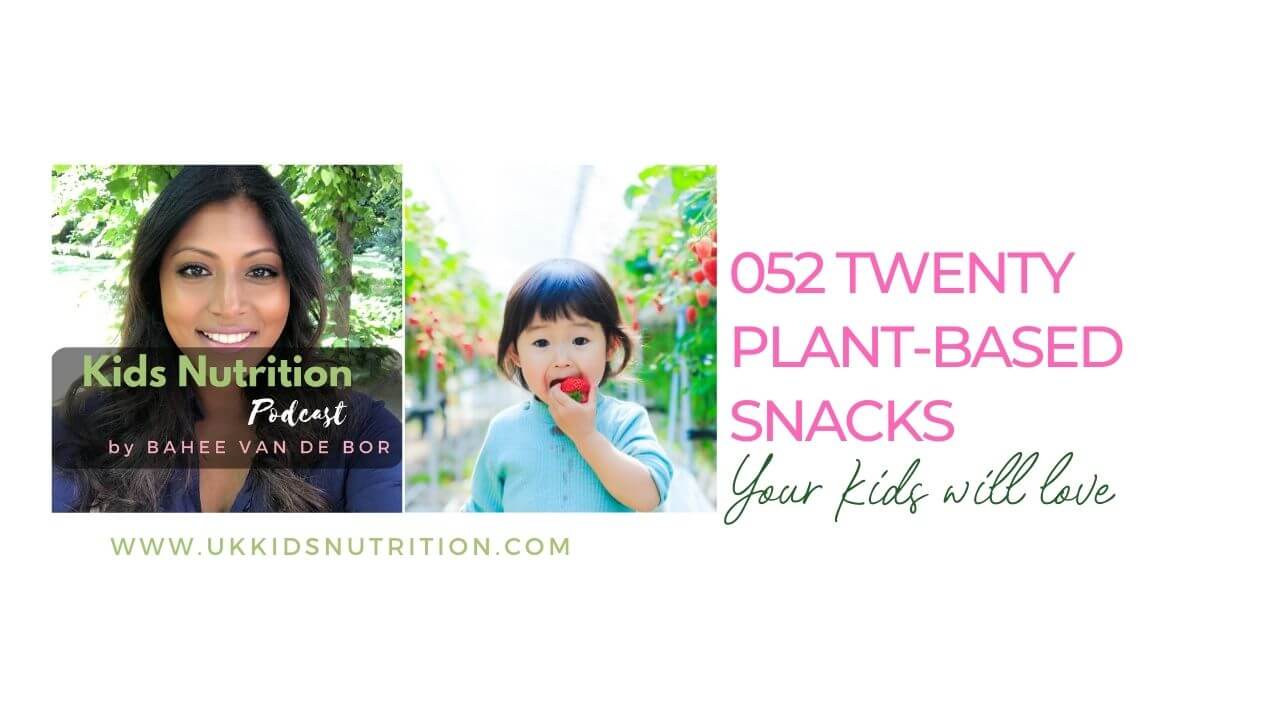
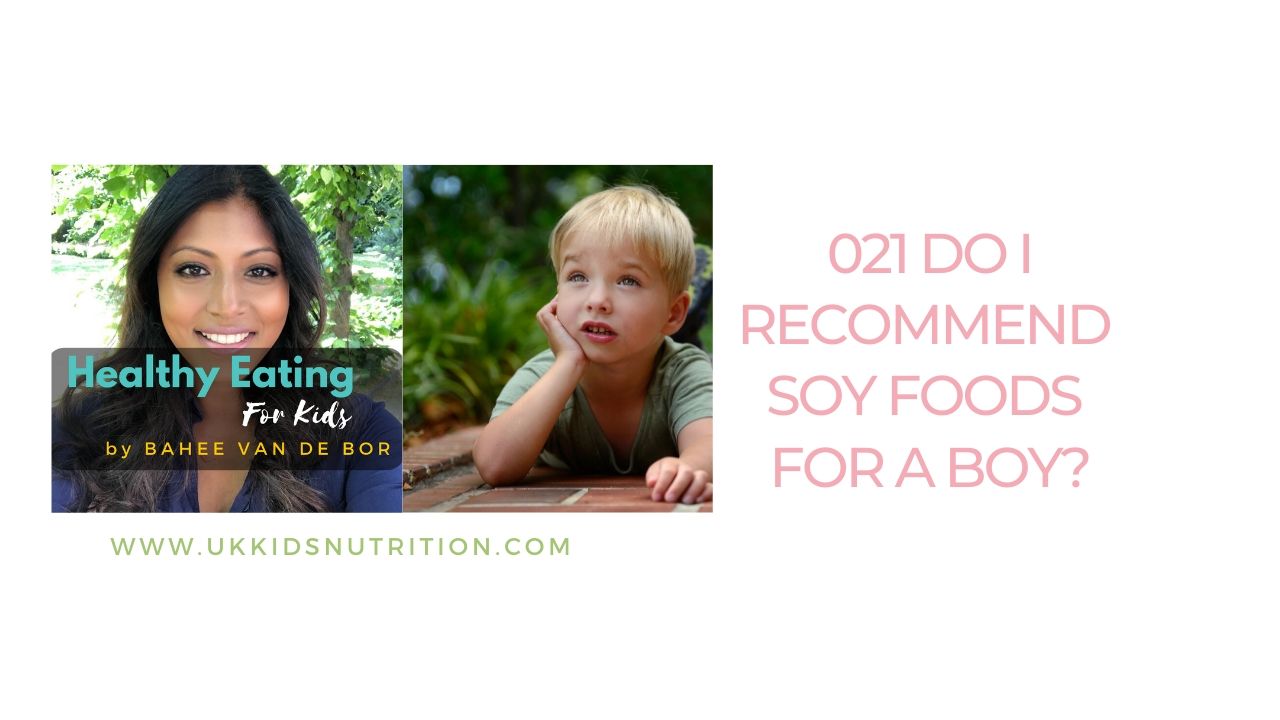
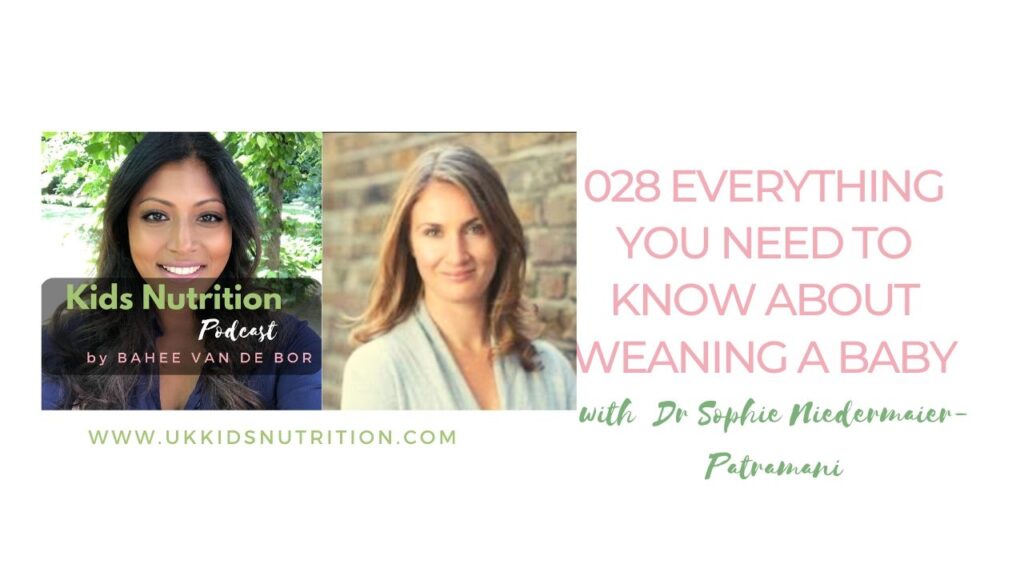
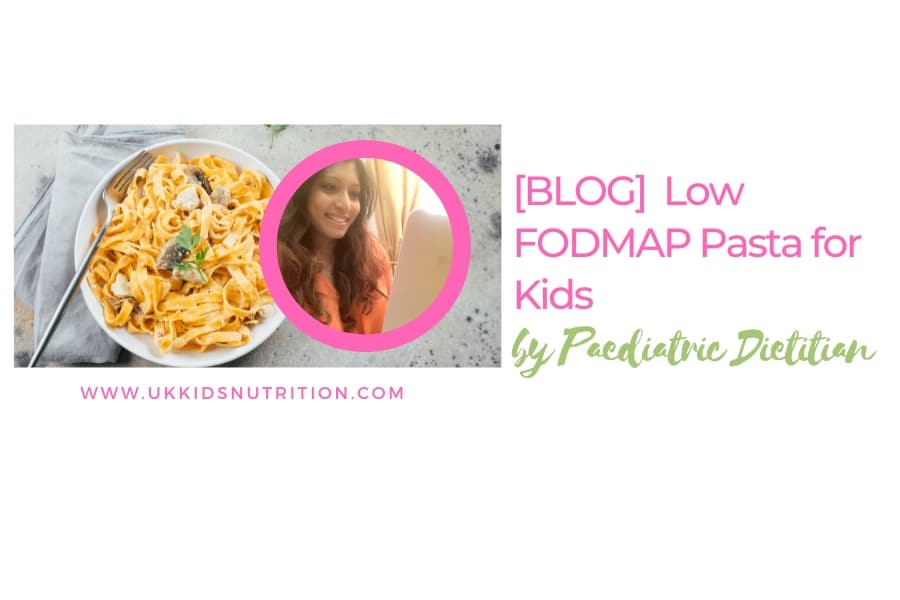
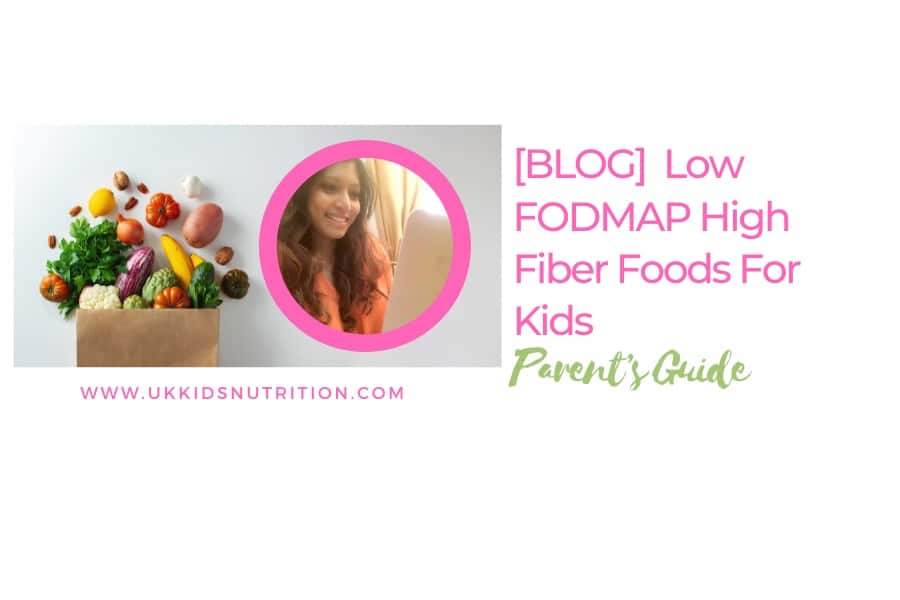
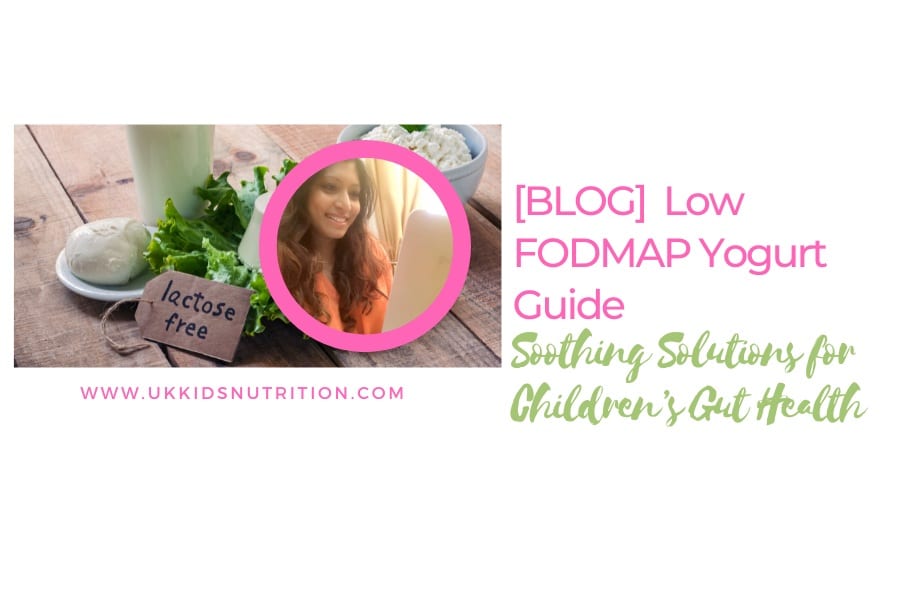
One thought on “Family Guide For Vegan Beginners”
I really liked to read about “Family Guide For Vegan Beginners”
What a great guide and a really informative article!
I marked your site will visit on a regular basis to find more useful information.
Keep up with the great job.